Venezuela security forces swoop on activists as repression worsens
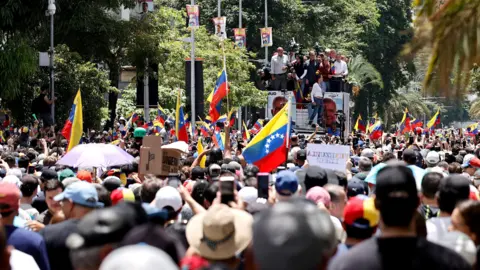 EPA
EPAThe video begins with loud bangs on a door that leads to a dimly lit stairwell.
“They are entering my home arbitrarily. They are destroying the door,” a woman can be heard crying.
It is the voice of María Oropeza, a campaign co-ordinator for opposition coalition Vente Venezuela, who is live streaming her detention on Instagram.
The bangs increase in intensity as she tells her followers that she has done nothing wrong: “I am not a criminal.”
Officials from Venezuela’s military counterintelligence agency then burst through her door and the video cuts to black.
Ms Oropeza is the latest opposition figure who has been detained following the announcement in the early hours of 29 July of Venezuela’s disputed presidential election result.
In the days since, members of the security forces have seized Freddy Superlano and Roland Carreño – both of whom worked for the opposition party Popular Will – and Ricardo Estévez, a technical adviser for the same opposition movement as Ms Oropeza.
Targeted arrests
Amnesty International told the BBC they had “well-founded reasons to believe [the detained people's] lives and integrity are at risk”.
The pressure group says that they have been seeing a new pattern of more targeted arrests by the Venezuelan authorities since the election.
Many of those detained have reportedly not been told why they were being arrested.
In the live stream of Ms Oropeza’s detention, she can be heard asking those banging on her door if they have a search warrant. She receives no answer.
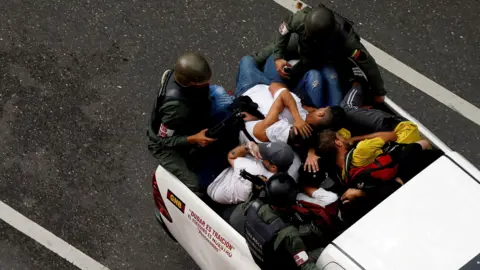 Reuters
ReutersTension has been high since Venezuela’s National Electoral Council declared President Nicolás Maduro the winner of the election - a declaration that was immediately dismissed by the opposition, which said it had proof that it, not the government had won. Mass anti-government protests quickly followed.
President Maduro accused the opposition of instigating a “coup” and announced plans to build two new maximum-security prisons to house protesters it accuses of being “criminal fascists”.
The government says more than 2,000 people have been detained, some of which it accuses of “terrorism”.
Clara del Campo, Amnesty International’s Americas senior campaigner, said the arbitrary detentions had followed a “two-pronged trend”.
“On the one hand, they have been massive and indiscriminate when it comes to protesters who took to the streets to support the opposition’s claim to election victory and, on the other, targeted and selected towards human rights defenders and opposition members,” she explained.
According to Ms del Campo, the mass detention of protesters is aimed at punishing and dissuading people from publicly expressing dissent.
It is an observation echoed by Venezuelan human rights NGO Foro Penal, which told BBC Mundo that it had witnessed an unprecedented “escalation of repression”.
Foro Penal has received reports of people who had their phones checked arbitrarily while they were walking down the street, with the security officials stopping them citing social media posts or messages as the reason for their subsequent arrest.
The NGO told the BBC that people arrested in this manner have typically been held in detention centres without access to independent lawyers.
These detentions have led to a culture of fear, with some people now worried about sharing information on social media, attending protests, or even raising the alarm about people who have been seized for fear of punishment.
President Maduro himself has spoken of a strategy he called “Operation Tun Tun” (Operation Knock Knock).
Rights groups say it consists of the authorities going door-to-door to detain those with links to the protests or the opposition.
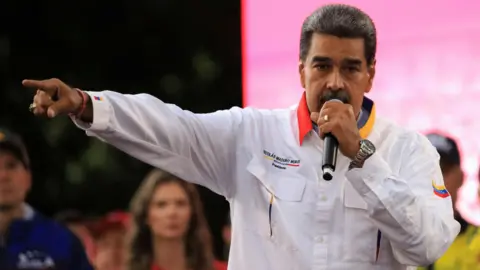 Reuters
ReutersMore than 2,000 have been detained since the election, according to government figures. Amnesty International says that among them are more than 100 children aged between 13 and 17 and at least six people with disabilities.
Ms Del Campo said those detained were “largely accused of ‘terrorism’ and related crimes, denied legal defence, remain disappeared and incommunicado, and are at high risk of ill treatment”.
She also said that human rights defenders and members of the opposition had been specifically targeted so as to “curtail political participation and the protection of rights”.
One of them is Kennedy Tejeda - a young pro-bono human rights lawyer with Foro Penal - who was arrested as he was trying to assist other people detained for protesting.
As well as implementing its “Operation Knock Knock”, the authorities have also targeted activists and opposition members in other ways.
The BBC has been told about dozens of people, including journalists and activists, whose passports have been revoked.
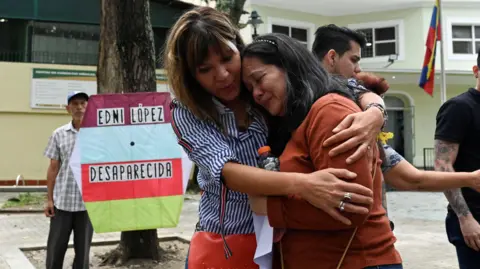 Reuters
ReutersEdni López, a university professor and humanitarian worker who assisted many NGOs in Venezuela, was detained on the morning of 4 August at the international airport in the capital, Caracas.
She was planning to board a flight to Colombia from where she was going to fly to Argentina for a holiday with friends.
She last contacted her friends and boyfriend from the airport. In Whatsapp messages seen by the BBC, she told them that the migration authorities claimed her passport was “expired”, despite it being in date. They then lost contact with Ms López.
The airport later informed them she did not board her Avianca airlines flight.
A close friend of hers told the BBC that Ms López’s case was not unique: “Many people with no ties to any political cause have stated that their passports have been cancelled as well.”
The friend, who asked to remain unnamed, said that there were apparently “no clear criteria” for deciding whose passports were void and called the detentions “unconstitutional”.
'Give me back my daughter'
The BBC has approached the Venezuelan government and Avianca for comment. Avianca said it could not comment on specific passenger cases unless ordered to by an authority, but added the airline only allowed passengers who in addition to meeting travel requirements had been approved by the country’s authorities beforehand.
We have not yet received a reply from the government.
Talking to reporters, Edni López’s mother made a plea to the country’s authorities: “Give me back my daughter, it’s not fair that a Venezuelan mother has to go through this.”
She also said that her daughter had a health condition that required daily medication.
After two days in which they visited several detention centres, her family finally learned that she was being held at one of them and told she would be taken to court in the city of La Guaira.
They have so far received no information about the charges being brought against her.
Her friend described the situation as “overwhelming”. “We don’t know the conditions of her captivity.”
Another person close to Ms López told the BBC: “The only reason we think this measure was taken is because she works in the humanitarian sector and because she is a university professor.”
The friend added that they had heard that the charges against Ms López were of a political nature.
“I can attest and testify that Edni has not participated in any political event, much less that she has issued or made a political publication on any [social] network or platform,” the friend insisted.
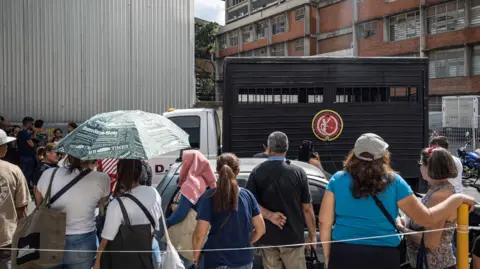 EPA
EPAMs López is not the only person to be detained at the airport.
A day earlier, prominent LGBT activist Yendri Omar Velásquez was also seized at the same airport as he was trying to leave Venezuela to report human rights violations to the United Nations.
He was told his passport was cancelled and was held for six hours before being released.
The impact of these detentions is immense, not only on those who are seized by the authorities but also on those close to them.
Ms López’s friends and relatives asked not to be named, fearing they could face repercussions for simply highlighting her plight.
Human rights groups say that this fear is exactly what the authorities are trying to achieve.
They argue that by targeting rights activists and lawyers - the very people that those swept up in the mass arrests may turn to for help - those already in detention are further isolated, and those who may think of speaking out will be deterred.
